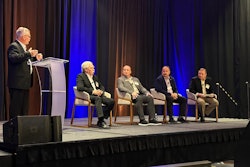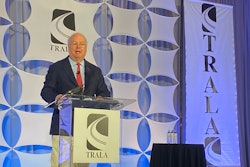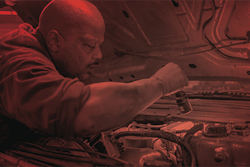
No one likes to see money walking out the door.
But everyone in distribution, particularly those who survived the roll-up era, either knows someone or has firsthand experience watching six figures’ worth of business escape with the actions of a single employee.
That’s when you really realize just how important your counter sales staff is.
“I think it’s a central role, particularly when we’re talking branch level,” says Chuck Udell, senior partner with Essential Action Design Group. “This person is responsible for really taking care of the customer…I look at the counterperson as a position of trust, because so often someone [the customer] will say ‘my counterperson.’
“It’s a two-edged sword of course because a lot of times if that counterperson leaves, sometimes a bunch of customers go with that person.”
In addition to possibly taking customers away, there is often a noticeable vacuum of product and business knowledge when a good, experienced counterperson leaves.
Finding, developing and retaining great counter sales staff should be a priority for any distributor. The impact on the bottom line is immense, both from a pure revenue standpoint and for keeping customers satisfied for repeat and increased business.
“The impact on the bottom line is absolute,” says Don Reimondo, president of Heavy Duty America.
GETTING TO GREAT
While they go by different names – counterperson, parts specialist, inside salesperson – they all share one thing in common: it takes a broad skill set to excel in the position.
“They’re the first line of defense for anybody calling or walking into the store,” says Shawn Shumaker, Heavy Duty America’s director of purchasing and a former parts counterperson. “They’re the first voice customers hear or the first face they see and they are expected to know everything.
“They’ve got to be able to react and think quickly under gunfire. When the counter gets busy and the phones are ringing off the hook, they have to maintain a level head and still be able to smile at the customer.”
Obviously, it’s not an easy job. There are constant internal and external pressures. They often play a strong supporting role to the outside sales efforts, they need to work closely with pickers and procurers, and they need to handle a constant flow of customer contact through telephone, e-mail and walking in the door.
“You’ll see counter professionals with two phones to their ears, nose buried in a paper catalog or in an electronic catalog,” says Brian Cruickshank, director of the University of the Aftermarket at Northwood University. “That’s how they spend their day.”
That’s why when asked what traits it takes to make a great counterperson, most cite qualities that are more inherent and personality driven than things that can be learned.
“To me, the most important trait is a dedication to their profession, followed by a dedication to their customers,” says Dave Milne, ASE executive director of special testing programs. “Beyond that, they need the kind of qualities that you can’t teach, and that’s patience, honesty and perseverance.”
Udell refers to the old adage, “hire for attitude and train for aftermarket knowledge and skills.”
But the willingness to learn also is essential, and no easy task considering the breadth of knowledge required to perform the job well. It demands almost encyclopedic knowledge of parts, systems and applications; the resourcefulness to seek out what you don’t know; and an almost innate ability to learn customer requirements.
“The great counterperson has to be able to anticipate the needs of that customer or prospect,” says Udell. “They have got to get to know that individual and they have to be able to ask the right types of questions.”
Because too often they will encounter a customer who is in dire need of guidance and may not even know it.
“The problem is sometimes a mechanic, who is really just a parts changer, will come in and throw something down on the counter and say ‘I need another one of these,’” says Shumaker. “And the counterperson gives him one, he goes off and then comes back and says ‘you sold me a bad part.’
“The counterperson has to be technically savvy enough to understand, ‘wait a minute, there’s something else going on here.’ He has to explain to the customer that there’s something else going on.”
Another learned skill that can be an invaluable asset, particularly in certain parts of the country, is bilingualism.
“There are lots of markets where it’s not so obvious, but still, having counter staff that speaks the same languages as their customer base is really important,” Cruickshank says. “That could be Korean or Japanese or Tagalog or Spanish or whatever, depending on where you are in the United States.
“It’s not diversity for diversity’s sake. It’s diversity for customer service purposes.”
To that point, he adds, many electronic catalogs are being offered in different languages.
TOOLS AND TRAINING
Generally, parts specialists will be recruited from another distributor or groomed from within. For the latter option, they usually are brought up from more entry-level positions such as parts deliverers and warehouse pickers. Sometimes, service technicians make their way to the counter after an injury or because they are just looking for less physically taxing work.
 It’s a workday not every one can handle. Parts counter salespeople face a constant barrage of customer contact via phone, e-mail and walk-in traffic.
It’s a workday not every one can handle. Parts counter salespeople face a constant barrage of customer contact via phone, e-mail and walk-in traffic.“Those [types of people] generally make a very good counterperson also because they come with such a strong basis for product knowledge,” says Milne. “That’s really the toughest thing that we have to instruct counterpeople in is the very broad spectrum of products that they have to deal with and becoming familiar with those products and what’s best to recommend and what’s required to do the entire job in terms of parts.”
According to Milne, ASE offers three certification tests for commercial vehicle parts specialists:
* Medium- and Heavy-duty Truck Dealership Parts Specialist Test;
* Medium- and Heavy-duty Truck Aftermarket Brake Parts Specialist Test; and
* Medium- and Heavy-duty Truck Aftermarket Suspension and Steering Parts Specialist Test.
There are also various vocational schools and technical colleges that offer parts specialist degrees and certifications. But a lot of the knowledge and skills are learned on the job.
“There are programs at the various technical colleges and schools, like Northwood University. The best training and where most of the great ones get their start is on the job, shadowing or working around a very strong senior counterman,” says Tim Kraus, president and chief operating officer of the Heavy Duty Manufacturers Association. “Suppliers all have field people who are capable of working on training issues with countermen. The good ones develop relationships with the customer service people at the factories.
“Make sure that any and all product and technical training that is offered to customers is also made available to the people on the counter,” continues Kraus. “They are the main interface with the customer and need to be kept up to speed on any and all new developments, promotions, etc.”
It’s a commitment that management needs to make.
“They need to look at training as an investment,” says Udell.” They need to select the right programs for the right people at the right times so they get a positive ROI on that initiative.”
Udell says a proven way to develop both customer and product knowledge is to occasionally pair a counter salesperson with an outside salesperson for key customer visits. It strengthens the relationship with the customer who may only know the counterperson through the sound of his or her voice. It also helps the counterperson better understand the customer’s business and challenges.
And, as a bonus, it can build understanding and camaraderie between the employees.
Extensive product knowledge is another differentiator between the good and the great counterperson. According to Milne, the ability to source parts for difficult or specialized applications is essential.
“The computer probably will walk you through 75 to 80 percent of what you need to know,” he says. “It’s the experience that helps you find the really tough applications, to gain the confidence of your customers. The hard part about this job is the very, very broad range of knowledge that a parts specialist has to have. All of the thousands of different products and manufacturers, and being able to develop what’s right for a particular task that the technician is trying to accomplish.”
In addition to knowing the right parts that are needed, parts specialists play the role of brand ambassadors. They often form loyalties to suppliers and products that they have come to trust and are comfortable recommending to customers. They are, in essence, an extension of a manufacturers’ sales force.
“I can’t overstate the importance of a smart, well-trained, enthusiastic counterperson,” says Cruickshank. “They are truly the lynchpin that connects the manufacturer to the customer. They are the brand ambassador of a manufacturer’s products.” He notes this role has become increasingly important during recent years as some suppliers scaled back their levels of field support due to budget constraints.
RETAINING RESOURCES
While the position can be a destination in and of itself, it is not unusual for counterpersons to eventually move on to become branch managers or even owners of their own stores.
“I will tell you there are numerous people in our industry who started out sweeping floors, worked their way to the counter and are now running companies, significant companies, today,” says Reimondo. “So they could end up anywhere. There is no end to where they could end up.”
Udell says strategies for keeping counterpeople should start from day one, acclimating them to the business culture and implementing the right orientation process.
“This goes beyond ‘stand over there and work with Lucy and see what she does,’” he says. “Orientation and on-boarding are important for not only products and customers, but also technology, how to work with the equipment and so forth. That does two things. Not only does it increase the knowledge of the counterperson, it helps the counterperson feel like they are a valued part of the organization.”
Another way to strengthen the bond is to share business information with them, including financial performance metrics. “They need to see sales, gross profit, expenses – and basically how the shop or how the branch is doing,” says Udell.
This not only builds the team environment and loyalty, it could help owners identify issues within their business that only the front-line experience and knowledge of the counter staff would reveal.
“The owner can’t make decisions in a vacuum,” Reimondo says. “If these guys or gals are responsible for selling the products that are sitting on those shelves, they’re going to be tasked with what they sell customers if it doesn’t fit right or they don’t have it. So they need to have buy-in on inventory, they need to have input on pricing, they need to have a say on the kinds of product lines that are stocked. All of those things.”
 Few, if any, employees are as close to the pulse of the aftermarket industry as parts specialists. Owners and managers should use this in-house resource when evaluating everything from adding product lines to pricing.
Few, if any, employees are as close to the pulse of the aftermarket industry as parts specialists. Owners and managers should use this in-house resource when evaluating everything from adding product lines to pricing.Shumaker recalls a distributor who made a decision to add a new product line without first consulting his counter staff. When the product failed to take off and the expected profits never materialized, he finally asked what the problem was and learned from a counterperson that the demand was never there in the first place.
Of course, fair compensation always is crucial in keeping employees onboard.
“There’s a lot of competition for good counter folks,” says Cruickshank. “If there’s one complaint I hear in the market, it’s pay.”
A strategy that works with some distributors is providing counterpeople with a commission in addition to salary, profit sharing or other sales-based incentives.
Whatever package is provided, it needs to complement that commitment to training and communication.
“Great countermen are typically very loyal to their employer. They should be well compensated, especially in tough markets,” says Kraus. “They should be always kept up to date on how the business is doing, where there are customer problems, what is happening in the field.”
Great parts specialists can make or break a business. It’s the decisions of the owners or top managers that determine which. n









